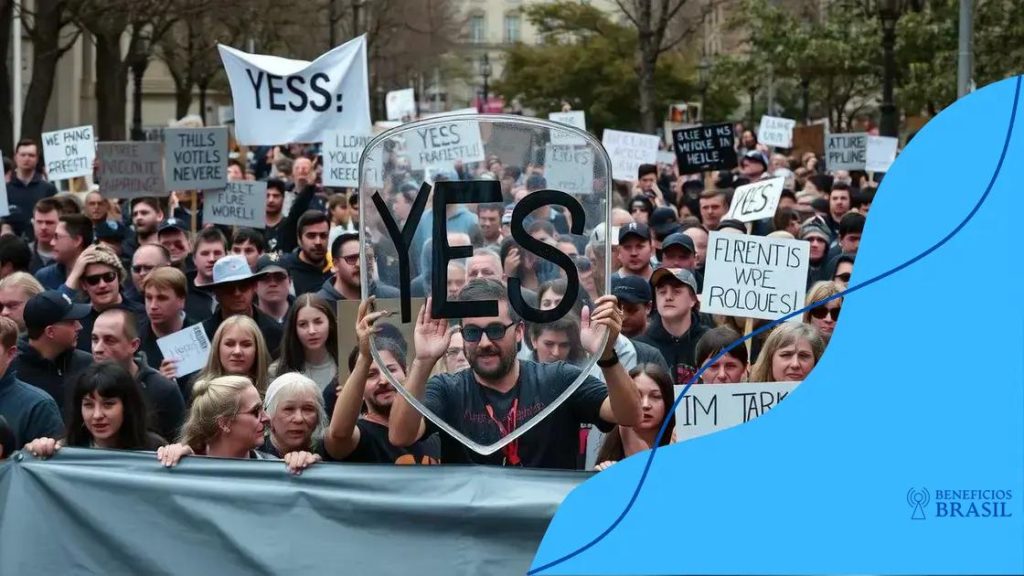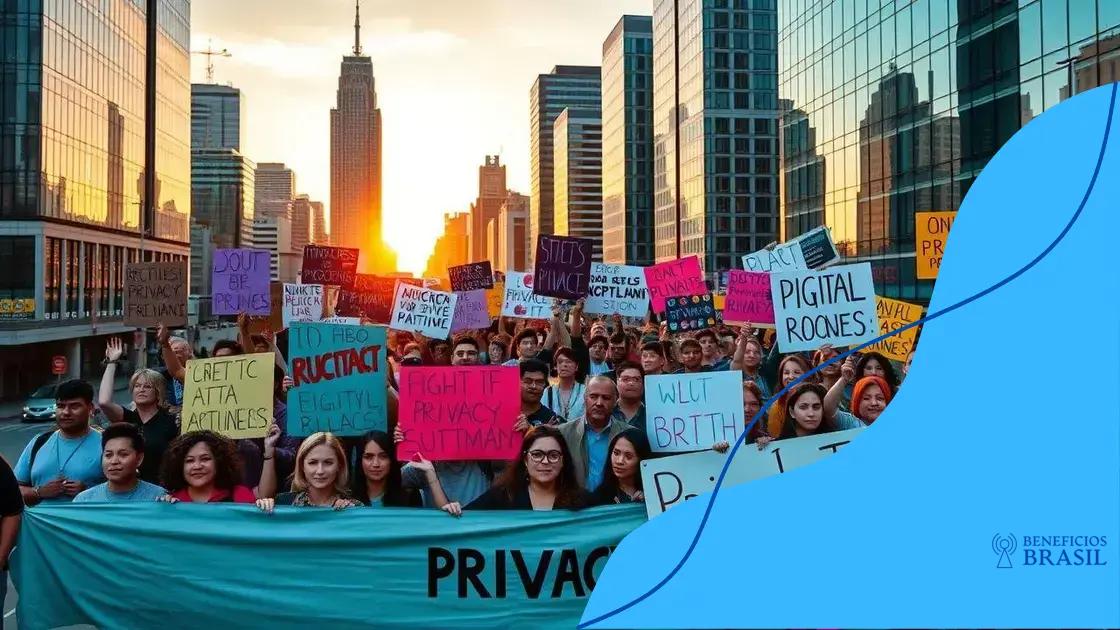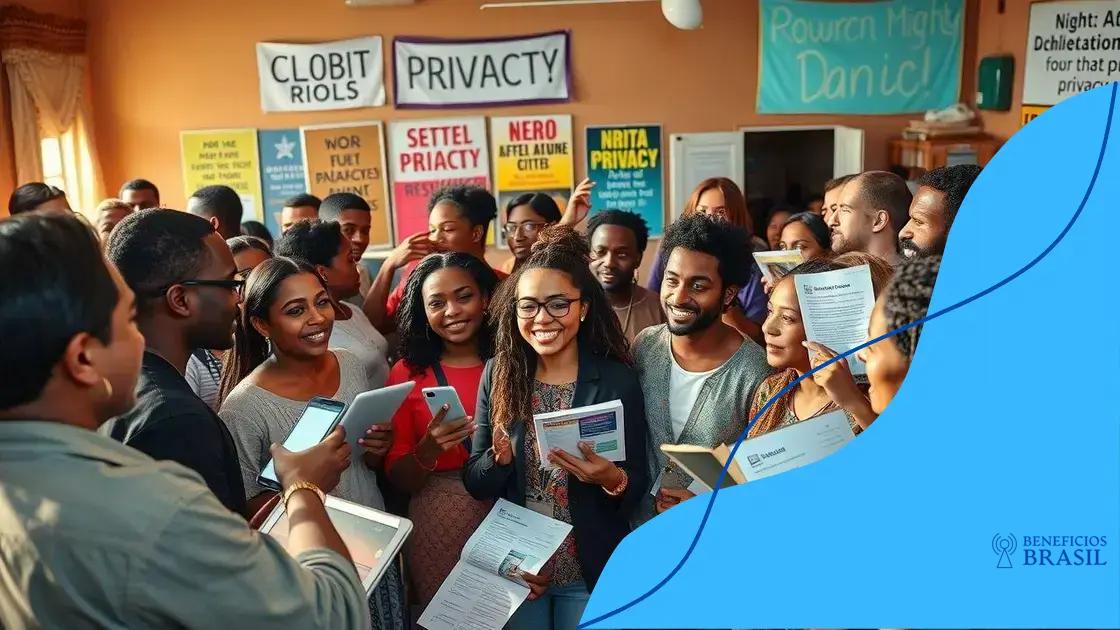Campaigns against online surveillance expansion: How to push back

Campaigns against online surveillance expansion focus on protecting privacy rights through education, grassroots activism, and policy advocacy, empowering individuals to resist invasive monitoring practices.
Campaigns against online surveillance expansion are rapidly gaining traction as more people become aware of the implications for their privacy. Have you ever wondered how deep the consequences go if we remain passive? Let’s dive into this vital topic.
Understanding the threat of online surveillance
Understanding the threat of online surveillance is essential in today’s digital age. As more of our lives shift online, we must be aware of how our data is collected and used.
The internet can feel like a vast space where we share freely; however, lurking behind our screens are various tools and technologies designed to track our every move. Companies, governments, and hackers utilize this data for various purposes, often without consent.
The main types of online surveillance
Different methods are used to carry out online surveillance, and recognizing them is crucial. These can include:
- Cookies: Small files stored on your device to track online activity.
- Geolocation tracking: Using devices to pinpoint your location.
- Social media monitoring: Scrutinizing user activity on social platforms to collect data.
Online surveillance is not only performed by tech giants but also by governments. Surveillance can happen through laws that monitor internet usage for security reasons. It is concerning when these powers go unchecked and infringe on personal privacy.
Why understanding is important
Grasping the implications of online surveillance helps individuals stay informed. Being aware can empower you to take steps to protect your privacy, such as using encryption tools and being cautious about the information you share online.
Knowledge of these threats also fuels campaigns against surveillance expansion. When more people recognize these dangers, they are more likely to join the fight to safeguard their digital rights. Ultimately, understanding is the first step in any effective defense.
Key players in the fight against surveillance

In the ongoing battle against surveillance, various key players lead the charge. These individuals and organizations play crucial roles in advocating for privacy rights and pushing back against invasive monitoring techniques.
Among the notable players are civil rights groups that raise awareness and advocate for policy changes. Their efforts help inform the public and mobilize community action. Another important entity is independent watchdog organizations. They analyze government actions and highlight cases of overreach, ensuring that the public remains informed about their rights.
Influential organizations involved
Several organizations work tirelessly in this space:
- Electronic Frontier Foundation (EFF): A leading nonprofit defending civil liberties in the digital world.
- American Civil Liberties Union (ACLU): Protects individual rights and liberties guaranteed by the Constitution.
- Privacy International: Focuses on fighting for the right to privacy globally.
These organizations often collaborate with tech experts to develop solutions that protect user data. They focus on advocating for stronger regulations and fostering discussions on ethical technology use.
Grassroots movements and activists
Grassroots movements also play a vital role in opposing surveillance expansion. Local activists raise awareness about privacy issues in their communities. They organize protests, campaigns, and educational workshops to inform others about the risks of unwarranted monitoring. By engaging citizens at the community level, these movements build support for policy changes that enhance privacy protections.
Together, these key players create a robust network of support. By standing united, they challenge the normalization of surveillance and advocate for a world where privacy is respected and protected. The fight against surveillance is multifaceted, and understanding the roles of these players is essential for everyone hoping to safeguard their personal freedoms.
Successful campaigns that made a difference
Successful campaigns that made a difference in the fight against surveillance have demonstrated the power of collective action. These campaigns not only raise awareness but also inspire changes in laws and public policies.
For example, one of the most notable campaigns is the Digital Privacy Act. This initiative engaged citizens by educating them about their rights and mobilizing them to advocate for stronger privacy protections. As a result, many lawmakers began to take the issue of surveillance seriously, leading to significant policy reforms.
Key features of impactful campaigns
What makes some campaigns so effective? Here are a few key characteristics:
- Community Engagement: Successful campaigns often involve local communities, ensuring that their voices are heard.
- Clear Messaging: People are more likely to join a campaign when the goals are clearly defined and communicated.
- Utilizing Digital Tools: Social media and online platforms can spread awareness rapidly and bring people together.
Another successful example is the Stop Watching Us campaign, which united diverse groups against government surveillance practices. This movement harnessed the power of online petitions and grassroots activism to rally massive public support.
The role of coalitions in campaigns
Coalitions can greatly enhance the success of anti-surveillance campaigns. By bringing together various organizations, these coalitions can pool resources and expertise to amplify their impact. Collaborations enable wider outreach, fostering a shared message that resonates with a broader audience.
The success of these campaigns proves that informed citizens who advocate for their rights can drive change. By learning from these successful strategies, future efforts can continue to push back against increasing surveillance measures.
Ways individuals can contribute to the cause

Individuals can play a significant role in the fight against surveillance. By taking small yet impactful steps, everyone can contribute to the cause of protecting privacy rights.
One effective way to contribute is through education. Sharing knowledge about the implications of surveillance with friends and family can raise awareness. When people understand the risks involved, they are more likely to take action.
Practical steps to make a difference
Here are some practical ways individuals can help:
- Use privacy tools: Utilize VPNs, encrypted messaging apps, and secure browsers to protect personal data.
- Participate in campaigns: Join or support initiatives that aim to curtail government and corporate surveillance.
- Stay informed: Follow news on privacy issues and engage in discussions about technology laws affecting civil liberties.
- Advocate for policy change: Write to local representatives expressing concerns about surveillance practices and urging for stronger protections of privacy.
Additionally, supporting organizations that focus on digital rights can amplify your impact. Donations or volunteering with nonprofits can help further their mission, which often includes campaigns against unwarranted surveillance.
Cultivating a privacy-conscious community
Building a community that values privacy is also vital. Hosting workshops or information sessions to educate others about digital privacy can create a supportive environment. The more people are aware, the stronger the movement against surveillance becomes.
Engaging in dialogue about personal experiences with privacy can enhance understanding and strengthen community ties. When people share, it helps others feel less isolated in their concerns about surveillance.
Future directions for anti-surveillance activism
Future directions for anti-surveillance activism are vital as technology evolves. As new methods of monitoring emerge, activists need to adapt their strategies to continue protecting privacy rights.
One crucial area of focus is the development of innovative technologies that enhance privacy. This includes creating stronger encryption tools, decentralized communication platforms, and software that minimizes data collection. By investing in technology that prioritizes user privacy, activists can provide alternatives to systems that rely on constant surveillance.
Evolving campaigns and coalitions
As the landscape of surveillance changes, so must the campaigns. Campaigns will likely become more digitally savvy, utilizing social media to mobilize support quickly. Engaging younger generations through platforms they use can foster a stronger community around privacy rights.
- Building coalitions: Collaborations between organizations fighting for civil liberties can amplify their voices.
- Leveraging grassroots movements: Local activists are essential for engaging communities directly affected by surveillance.
- Education and outreach: Teaching the public about their rights can empower them to act against surveillance.
Furthermore, future activism might focus on influencing legislation. Activists can push for laws that protect data privacy and limit surveillance practices. Using data from past campaigns, they can present compelling evidence to lawmakers about the need for reforms.
The role of public awareness
Public awareness will continue to be a key element in the fight against surveillance. Activists will need to create engaging content that informs and resonates with diverse audiences. Creative approaches such as art installations, documentaries, or interactive exhibits can highlight the risks of surveillance while conveying the importance of protecting individual freedoms.
By adapting to new challenges and continuously refining their techniques, anti-surveillance activism can remain effective. The future of this movement lies in its ability to educate, engage, and empower people to take action against invasive practices.
FAQ – Frequently Asked Questions about Anti-Surveillance Activism
What is anti-surveillance activism?
Anti-surveillance activism aims to protect individual privacy rights and reduce invasive monitoring practices by advocating for policy changes and raising public awareness.
How can individuals participate in anti-surveillance efforts?
Individuals can participate by staying informed, using privacy tools, joining campaigns, advocating for change, and educating others about surveillance issues.
What are some common privacy tools recommended for protection?
Common privacy tools include VPNs, encrypted messaging apps, and secure browsers that help protect personal data from unauthorized access.
Why is public awareness important in the fight against surveillance?
Public awareness is crucial because it empowers individuals to understand their rights, fosters community engagement, and drives demand for privacy-enhancing policies.
